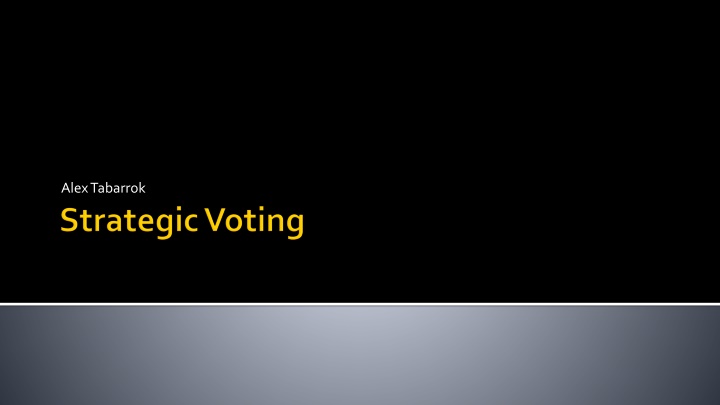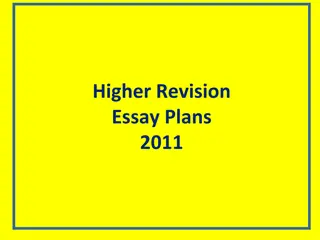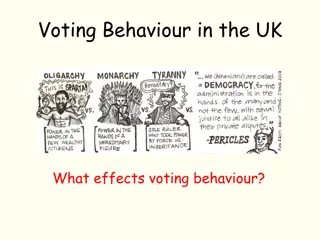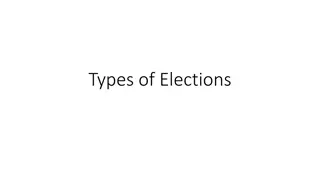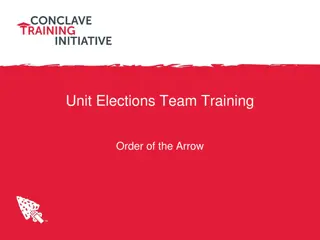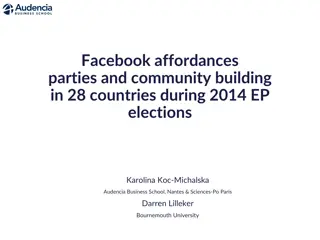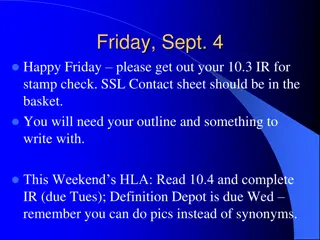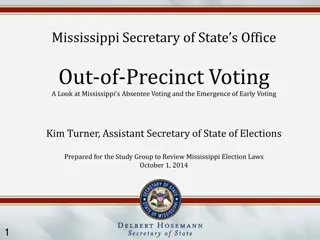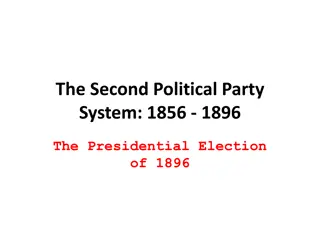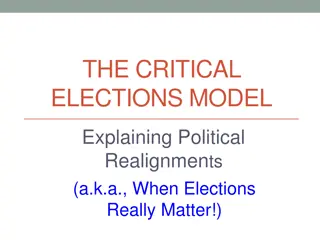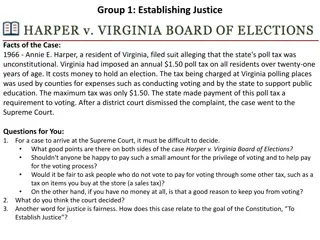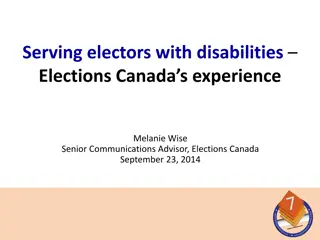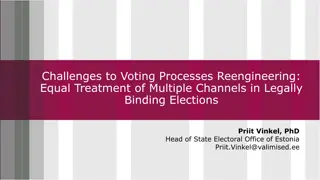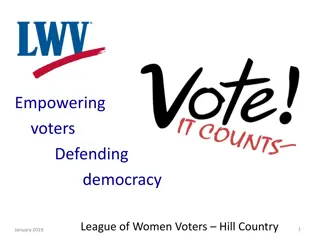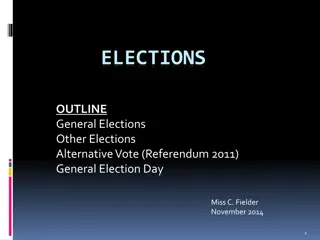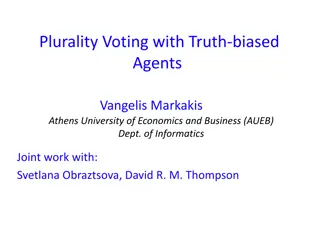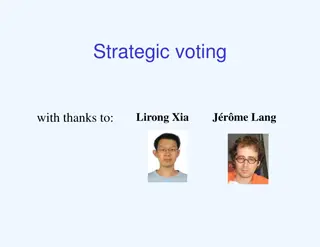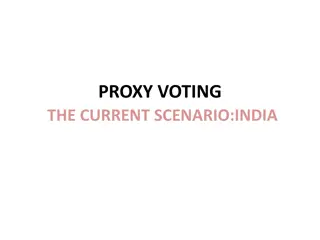Strategic Voting in Political Elections: An Analysis of Sincere vs. Strategic Voting
Voters sometimes opt for strategic instead of sincere voting, aiming to achieve better outcomes. The concept is illustrated through scenarios involving candidates like Bork, Ginsberg, Kennedy, and Vacant in a political election context, showcasing how preferences and strategic decisions can influence election results.
Download Presentation

Please find below an Image/Link to download the presentation.
The content on the website is provided AS IS for your information and personal use only. It may not be sold, licensed, or shared on other websites without obtaining consent from the author.If you encounter any issues during the download, it is possible that the publisher has removed the file from their server.
You are allowed to download the files provided on this website for personal or commercial use, subject to the condition that they are used lawfully. All files are the property of their respective owners.
The content on the website is provided AS IS for your information and personal use only. It may not be sold, licensed, or shared on other websites without obtaining consent from the author.
E N D
Presentation Transcript
Up to now we have assumed that voters will vote for the candidate that they most prefer. Also called sincere voting. In some situations, however, a voter can do better by voting insincerely also called sophisticated or strategic voting. E.g. Bush, Gore, Nader. Voters who rank Nader the highest may instead vote for their second choice, Gore, because if they vote for Nader they fear they will get Bush. A voter who ranks Nader highest but who votes for 2ndchoice Gore is voting insincerely but strategically. Strategic voting doesn t solve any of our previous problems but it does change outcomes in often interesting ways.
During Reagans term there was a battle to appoint a judge to the Supreme Court. Bork was the first nominee but it was widely expected that if Bork was rejected Ginsberg would be nominated and if not him then Kennedy and if not him then Vacant.
Suppose preferences are as follows: Senator A Kennedy Vacant Bork Ginsberg Senator B Ginsberg Kennedy Vacant Bork Senator C Vacant Bork Ginsberg Kennedy 1st 2nd 3rd 4th What happens? Solve first with sincere voting where each voter says no if a more preferred candidate is yet to come. Bork? Everyone votes against Bork. Bork loses. Ginsberg? A, C vote no. Ginsberg loses. Kennedy? A, B vote yes. Kennedy wins.
Now we solve using strategic voting. Look forward, reason backward. Ifwe get to Kennedy v. Vacant then it s the end of the road and there is no longer any reason to vote strategically so we know that Kennedy will win. But that meansthat if we get to Ginsberg it s really Ginsberg v. Kennedy. So what will happen? B and C prefer Ginsberg to Kennedy so if we get to Ginsberg, Ginsberg will win. But that means that if we get to Bork its really Bork v. Ginsberg. A and C prefer Bork to Ginsberg so Bork wins! Under sincere voting everyone votes against Bork. Under strategic voting Bork wins. Bork wins even though everyone prefers Vacant to Bork! Senator A Kennedy Vacant Bork Ginsberg Senator B Ginsberg Kennedy Vacant Bork Senator C Vacant Bork Ginsberg Kennedy 1st 2nd 3rd 4th
Given that everyone prefers Vacant to Bork will the strategic equilibrium we discussed happen? Hard to say. If some of the Senators trust one another, vote trading (also called logrolling) is another possibility. Suppose A agrees to vote against Bork if B will vote against Ginsberg (her top choice) then Kennedy could win making A and B better off. Or C may promise to vote against Bork if A promises to vote against Kennedy (and Ginsberg) so Vacant wins. We can t say which of these might occur. Senator A Kennedy Vacant Bork Ginsberg Senator B Ginsberg Kennedy Vacant Bork Senator C Vacant Bork Ginsberg Kennedy 1st 2nd 3rd 4th
Suppose that in Bush, Clinton, Perot everyone ranks Perot first but everyone believes that only a minority rank Perot first. The result is that no one votes for Perot. Voters with Bush second vote for Bush to avoid Clinton and voters with Clinton second vote for Clinton to avoid Bush. After the vote everyone s beliefs seem to be validated. Hardly anyone voted for Perot! Self-fulfilling prophecy! Exit polls show that this kind of thing is surprisingly common when 3 or more parties are typical as in Canada or Great Britain.
Duvergers law: Plurality rule voting and single member- districts tend to generate a two party system. Two reasons: Single-member districts mean that a party that consistently comes in third will get no seats. Parties will adjust their policies towards those of the median voter squeezing out the middle party. Strategic voting -> voters who prefer the third party will vote for their second choice to avoid wasting their vote.
We can see some evidence for strategic voting in the distribution of votes for 2nd versus 3rd parties. Suppose that Pa>Pb>Pc where Pi is the probability party i wins. Suppose an election is close. How should voters vote? The only time voters should vote for a third party in a close election is when all the parties are close. In this case Pc/Pb should be close to 1. If the election is close and Pc is a clear third then a voter should never vote for party c so Pc/Pb should be close to zero. Thus in a close election there should be a bi-modal distribution of votes. What about when Pa is well ahead? In this case, no harm for voting for the third party and so distribution should be according to preferences (no tendency to bi-modal).
In close British elections, clear evidence that Pc/Pb is bi-modal. Gary Cox. 1997. Making Votes Count.
In non-close British elections, no evidence that Pc/Pb is bi-modal. Gary Cox. 1997. Making Votes Count.
All democratic voting systems can be strategically manipulated in some situations (when there are more than two alternatives). Closely related to Arrow s Theorem. E.g. Imagine that outcomes are non-transitive then the agenda matters. If positive association fails then we saw that it can be against your interest to vote for your favorite candidate. If IIA fails then lying about C can influence ranking of A and B. Etc. In what sense is an outcome right or legitimate when people vote non-sincerely?
